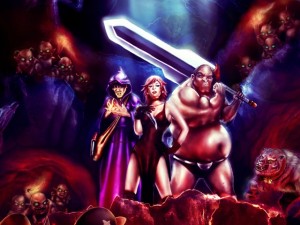Ouya’s Julie Uhrman posted a Blog update regarding her company’s much troubled Free The Games Fund. The fund, which provided money to successful Kickstarter projects meeting certain criteria, has been the subject of much derision due to some suspicious activity on the part of some parties involved.
 For example, MogoTXT’s Gridiron Thunder recently completed funding with $171,009 in pledges, which would have entitled them to over $121,000 in cash. The problem is that it earned that money with only 183 backers, which averages out to nearly $1,000 per backer. Turns out it was a group of the industry veterans wealthy friends contributing, something that wasn’t against the FTG Fund guidelines.
For example, MogoTXT’s Gridiron Thunder recently completed funding with $171,009 in pledges, which would have entitled them to over $121,000 in cash. The problem is that it earned that money with only 183 backers, which averages out to nearly $1,000 per backer. Turns out it was a group of the industry veterans wealthy friends contributing, something that wasn’t against the FTG Fund guidelines.
Then there’s the case of Victory Square Games’ point and click adventure title, Elementary, My Dear Holmes. It managed to raise over $50,000 during the course of its funding, but suspicions arose when people looked closer at the list of backers. According to someone that did a significant amount of digging, of the 740 backers the game had at one point 474 were new accounts with EMDH as their first backing project. Just as damming is the fact that many of the profiles had fake sounding names, profile pictures, and cities of residence.
Finally we have Dungeons : The Eye of Draconus by SuckerFree Games. Posted as a completion funding campaign for an already successfully funded game, SuckerFree was seeking $10,000 to finish their project, and eventually ended up with just over $54,000 from 180 backers. The real issue for some came when project lead William McDonald revealed that his father had pledged a significant amount in order to help make the team eligible for bonus funding from Ouya’s FTG program. Some saw it as an investment in family, others saw it as a cynical cash grab.
 The team behind Gridiron Thunder removed themselves from Ouya’s funding program, basically stating they didn’t really need the money anyway. Victory Square had their campaign and account suspended by Kickstarter, effectively killing the funding phase of the project, all the while claiming innocence. SuckerFree’s McDonald posted a fairly scathing update lashing out at MogoTXT and Ouya, stating that MogoTXT were a “…bunch of ex-EA employees with rich friends…” and that Ouya made them a fall guy by delisting them from FTG page without notification. He then cancelled his teams Kickstarter campaign citing the financial hardship the recent developments would bring. Pleasantly enough, he encouraged those reading to check out Infinitap’s Neverending Nightmares.
The team behind Gridiron Thunder removed themselves from Ouya’s funding program, basically stating they didn’t really need the money anyway. Victory Square had their campaign and account suspended by Kickstarter, effectively killing the funding phase of the project, all the while claiming innocence. SuckerFree’s McDonald posted a fairly scathing update lashing out at MogoTXT and Ouya, stating that MogoTXT were a “…bunch of ex-EA employees with rich friends…” and that Ouya made them a fall guy by delisting them from FTG page without notification. He then cancelled his teams Kickstarter campaign citing the financial hardship the recent developments would bring. Pleasantly enough, he encouraged those reading to check out Infinitap’s Neverending Nightmares.
 Given that none of the actions listed above were against the guidelines laid out by Ouya, it’s unfortunate that no one comes out of this mess looking good, particularly Ouya. The development teams didn’t act against the rules, even if it’s hard to argue that they weren’t disingenuous at best. On the other hand, if you offer people on the internet cash without setting very specific rules of conduct you’re asking for trouble. Ouya created a “Take Our Money” contest without either A: having the competence to see obvious loopholes, or B: being willing to own their own naive oversights.
Given that none of the actions listed above were against the guidelines laid out by Ouya, it’s unfortunate that no one comes out of this mess looking good, particularly Ouya. The development teams didn’t act against the rules, even if it’s hard to argue that they weren’t disingenuous at best. On the other hand, if you offer people on the internet cash without setting very specific rules of conduct you’re asking for trouble. Ouya created a “Take Our Money” contest without either A: having the competence to see obvious loopholes, or B: being willing to own their own naive oversights.
SuckerFree saw a financial opportunity and played the game within the agreed upon guidelines. The “spirit” of the program may have been violated, but while SuckerFree may be an indie studio, they’re still a company who’s purpose is to make money. They may have been a bit financially aggressive beyond their size, but there isn’t a company out there that doesn’t look for financial opportunities. That’s the difference between a company like Apple playing the tax game and Enron outright lying. They’re both dirty, but one is right, and one is wrong from a legal standpoint.
The solution in all of these situations is obvious.
- MogoTXT : While Technically allowed to keep the money, they’re high profile enough that the financial gain isn’t worth the hassle. Just gracefully back out of the program and maintain relationship with Ouya as a flagship studio with a major game. DONE
- Victory Square : Kickstarter investigates the funding activity and makes a determination on what happened. If there were indeed phantom backers, then that violates Kickstarters T&C’s. Kickstarter can then cancel the campaign, which is what it appears they did. Ouya has nothing to do with it at this point because there’s no violation of the FTG guidelines, other than the fact that a non-funded game can’t participate. DONE
- SuckerFree : Given the eventual transparency SuckerFree demonstrated, their backers can make their own determination on what to do. When you back a Kickstarter project you’re not locked into it. Don’t agree with how a developer is acting? Pull your funding. NOT DONE
- Ouya : Honor the eligible projects then revise the program. Write the program guidelines with actual humans in mind, understanding that when you put money on the table, people will do everything in, and outside of, the rules to get it. If it’s in the rules and you don’t like it, hopefully that’s a lesson for next time, in the mean time have some faith in your users and let them decide whether or not it’s a project they want to back financially. NOT DONE – Instead they secured the game they cared about, froze the program, and wielded the morality stick instead of the rule book.
At the end of the day we’ll have a mediocre football game on a over hyped console. A developer covered in the stench of possible fraud that will have to pick up the pieces to carry on with a promising looking adventure game. Most unfortunate though is the world has another person who feels turned on, and will undoubtedly be a bit more bitter because of it.



